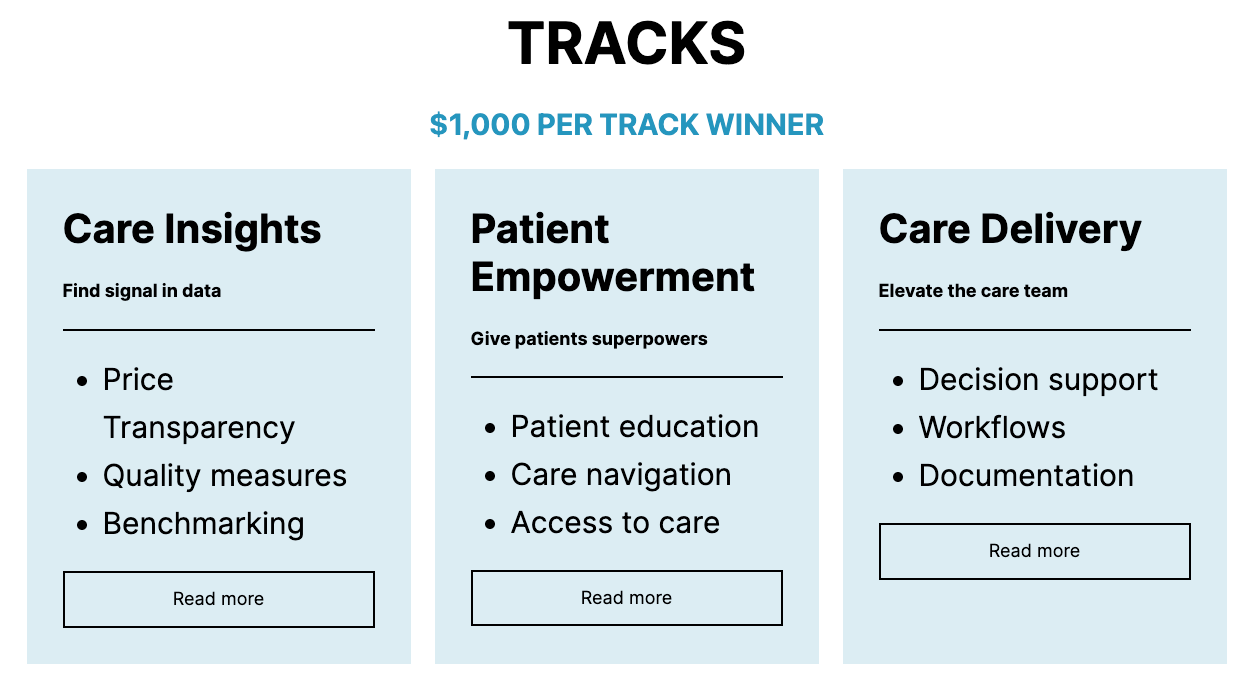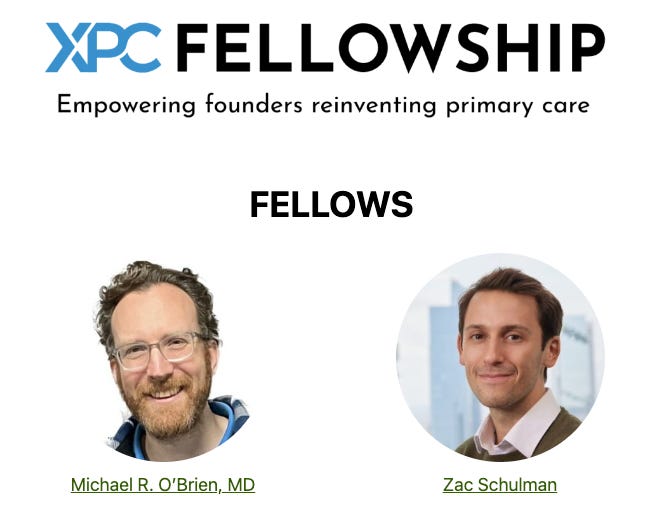Manifesting Collective Intelligence in Primary Care
TL;DR: 1) The hackathon was awesome. 2) The course was a success. 3) Fellowship launches today. 4) Team is growing.
Including our bonus recap video of the XPC hackathon and the Primary Care 101 course:
Part 1: XPC Hackathon
In June, XPC entered a new frontier of engaging our primary care innovation community by trailblazing a couple of new initiatives. From hanging out in most healthtech Slacks and attending major healthcare conferences over the last year, it has become evident that the appetite for building with peers and learning along the way is unmatched by existing opportunities in primary care. It was frustrating seeing conferences as celebrations of work yet to be done with so much untapped and hungry talent in attendance. Naturally, the idea of a 48-hour XPC Hackathon was born and we set to manifest “collective intelligence” and capture value from open innovation.

The goal of our hackathon was to bring a group of individuals passionate about primary care who normally do not get to interact in the same space. They would build for one of the three tracks: Care Insights, Patient Empowerment, and Care Delivery. Plus $5,000 in prize money was a cherry 🍒 on the top.
For some participants, our event was the catalyst to transition to healthcare from another industry (eg. fintech to healthtech). For others, it was the place to meet co-founders and start new ventures. We had a mix of seasoned founders as well budding entrepreneurs for whom this was their first ever hackathon. They were not alone.
We reached for the impossible and formed the most stellar advisory board that became fast friends. Our planning team represented the composition of hackathon dream teams consisting of engineering, clinical, product and strategy talent.
We recruited a rockstar line up of mentors across many of the silos we set out to break down and match the ambition of hundreds of participants across more than half of the world’s time zones. We learned afterwards that a number of mentors became formal advisors to some of the newly formed teams because they were there from the beginning.
We had a spectacular assembly of over 20 sponsors, big and small, including venture capital firms, open-source health tech startups, as well as EMR, data and insurance companies. They not only committed financial support and served as competition’s judges but also gave backstage access to their products and helped with mentoring visionary hackers and builders.
The event culminated with the award ceremony on the 51st hour of the hackathon after a two-hour sprint of judging all submissions and doing live pitches for Spark of Potential: Most Promising Startup Award.
Special mention of award winners:
Rogue - Team 58 (AI Frontier: Best AI Application Award) - helping doctors evaluate performance of AI models and understanding their biases
SimpleDoc - Team 33 (Patient Empowerment Award) - improving health literacy and reducing healthcare costs for patients
Recco - Team 26 (Care Delivery Award) - facilitating medication reconciliation using natural language via chatbot
NEXTpill - Team 54 (Care Insights Award) - synthesizing patient and payer data to improve clinical workflows
Triage.ai - Team 28 (Spark of Potential: Most Promising Startup Award) - standardizing clinical triage
Even though the event was virtual, the energy throughout the weekend was palpable from all stakeholders: participants, mentors, sponsors, and hosts. Shortly after the event, we began receiving messages and started seeing LinkedIn posts going up about everyone’s experiences.
Here are some of our favorite highlights:
Turquoise Health wins best hackathon journalism award (their article is a must-read recap): “Regardless of the scope of the solution (as broad as decreased costs for patients, employers, and providers and as granular as discharge disposition planning), all the groups honed in on the fact that in order for healthcare to improve, we’re going to need to be smart about pulling data from a number of different resources.”
Healthie, one of the most innovative EMR startups, celebrated with their community the sponsorship of their (and our) first Hackathon.
Metriport interviewed several teams that incorporated their open-source APIs and data streams into product demos.
Morgan Mendis and his team showcased their mini-design sprint from the hackathon. Really cool to see under the “hood” of innovation.
We loved Raji Reddy’s sincere reflection: “I’m famished by lack of food and sleep in last 48 hours, stress to perform was through the roof and now that our idea is submitted.. I’m trying to calm down, but it’s hard 😂 If you ask me if I will do this again.. oh yeah!!!”
Being a first-time hacker did not stop Neha Katyal from going all in: “Although we were all first-time hackers, we experienced the full product lifecycle in one go - understanding pain points, ideating opportunities, recruiting talent, building and iterating an MVP, UX/UI, testing on real datasets, creating a market strategy, and pitching to investors and end users.”
James Leonard experienced what we hoped to curate: “One of the coolest parts of the process was the opportunity to interact and pick the brains of all of the mentors.”
One of the unexpected and more fascinating outcomes of the hackathon was inspiring others to replicate this magical experience themselves. Several of our sponsors are launching their respective first ever virtual hackathons in the coming months (eg Health Universe Hackathon, AvoMD Hackathon). Stay tuned for another round of collective intelligence from the healthtech community.
Part 2: XPC Academy
Our second initiative in June came from our love for sharing what we know about primary care and our frustration of how much misunderstanding there exists about our specialty. Plus inbound of the same set of inquiries about pain points in care coordination of primary care patients or questions about opportunities in Direct Primary Care (see our landscape article) nudged us to package our knowledge into something that scales.
We launched XPC Academy with our Primary Care 101 course over four 2-hour interactive sessions. Similar to the crowd drawn by the hackathon, our learners came from various backgrounds: policy, tech, insurance, sales, and clinical. The course covered a 10,000 foot view of primary care across fifteen sessions, spanning frameworks, payment structures, office operations, and workflows.
In our true spirit of being tech-forward physicians, we employed the latest technology available, such as video editing with Descript and generating visuals with Midjourney.
A portion of the course was pre-recorded and played while learners interacted with us and each other on Slack in real time. At times, we could barely keep up with the pace of simultaneous conversations. Live discussions and polls took place during breaks in between recorded segments. The diversity of backgrounds in the audience generated many stimulating discussions.
This course served as the starting point for future 201 level courses. Each subsection could've been its own course. We are looking to work with partners to develop future courses. If you or your company has special knowledge on a certain topic and would like to do a deep dive with us in a 201 course, feel free to reach out.
Hot off the press: XPC Fellowship
Created to empower founders reinventing primary care, XPC Fellowship launches today. The fellowship is a six month immersive virtual program through structured mentorship and self-directed learning. There is no financial or equity cost to the Fellows. We are different from an incubator or accelerator because we pour energy and resources into people, not ventures. We invest time, not money. We do this through curated connections to break down silos across engineering, product, design, and clinical domains. If you think you’re at the frontier of primary care, we would love to hear from you. Fellowship applications are on a rolling basis, and you can apply starting today.
Our first cohort of Fellows include Michael O’Brien, MD and Zac Schulman. Michael is a med-peds physician executive who is building a healthtech startup to improve care navigation for young people with complex chronic conditions, starting with sickle cell patients. Zac is a medical student at Case Western and winner of the Patient Empowerment Award at our hackathon. He is working on improving health literacy for patients by taking SimpleDoc to the next level.
We are excited to collaborate with Sarah Gebauer, MD as our inaugural faculty and co-developer of the fellowship and its curriculum. Our inaugural partners include Metriport and Light-it who will serve as advisors to Fellows throughout the program.
XPC Team
To make this all possible, our team is growing with David Nichols, MD joining our core team as Partner and Celia Steigerwald as our Chief of Staff.
Dave is also a family physician whom we met over a year ago at DPC Summit. He’s a systems thinker who ran a successful cardiac rehab clinic throughout medical school and residency. Celia has been an admin extraordinaire for a decade and has the chops to keep us all in line.



















